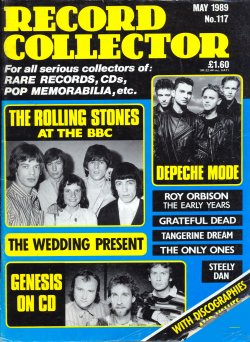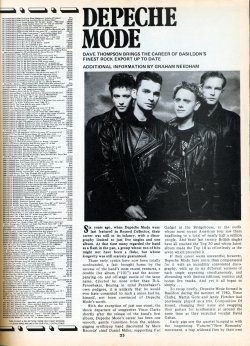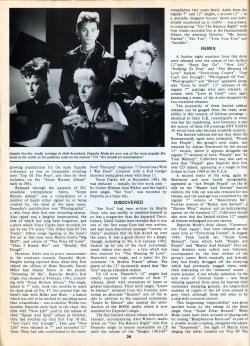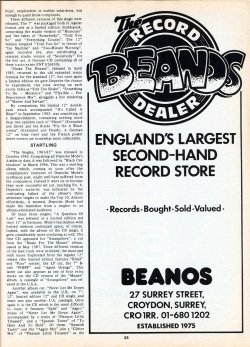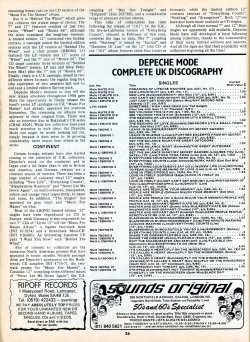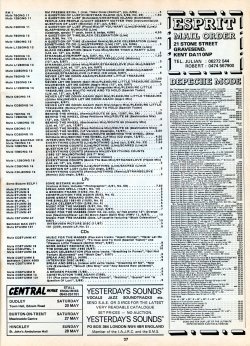- Joined
- Aug 15, 2019
- Messages
- 7,493
- Reaction score
- 143
- Points
- 63
Depeche Mode
[Record Collector, May 1989. Words: Dave Thompson / Graham Needham. Picture: Anton Corbijn.]
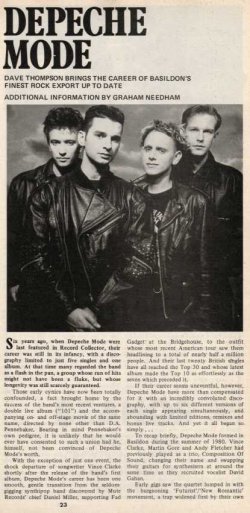
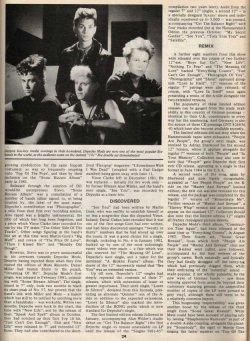

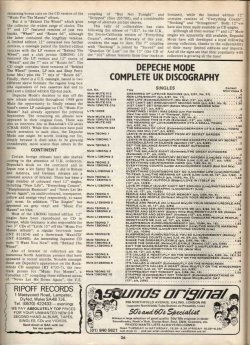
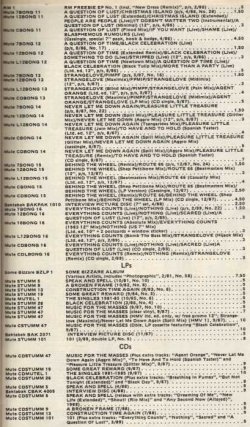
Six years ago, when Depeche Mode were last featured in Record Collector, their career was still in its infancy, with a discography limited to just five singles and one album. At that time many regarded the band as a flash in the pan, a group whose run of hits might not have been a fluke, but whose longevity was still scarcely guaranteed.
Those early cynics have now been totally confounded, a fact brought home by the success of the band's most recent ventures, a double live album ("101") and the accompanying on- and off-stage move of the same name, directed by none other than D. A. Pennebaker. Bearing in mind Pennebaker's own pedigree, it is unlikely that he would ever have consented to such a union had he, himself, not been convinced of Depeche Mode's worth.
With the exception of just one event, the shock departure of songwriter Vince Clarke shortly after the release of the band's first album, Depeche Mode's career has been one smooth, gentle transition from the seldom-gigging synthipop band discovered by Mute Records' chief Daniel Miller, supporting Fad Gadget at the Bridgehouse, to the outfit whose most recent American tour saw them headlining to a total of nearly half a million people. And their last twenty British singles have all reached the Top 30 and whose latest album made the Top 10 as effortlessly as the seven which preceded it.
If their career seems uneventful, however, Depeche Mode have more than compensated for it with an incredibly convoluted discography, with up to six different versions of each single appearing simultaneously, and abounding with limited editions, remixes and bonus live tracks. And yet it all began so simply...
To recap briefly, Depeche Mode formed in Basildon during the summer of 1980. Vince Clarke, Martin Gore and Andy Fletcher had previously played as a trio, Composition Of Sound, changing their name and swapping their guitars for synthesisers at around the same time as they recruited vocalist David Gahan.
Early gigs saw the quartet lumped in with the burgeoning 'Futurist'/'New Romantic' movement, a trap widened first by their own growing predilection for the same foppish costumery as was so frequently erupting onto 'Top Of The Pops', and then by their inclusion on the "Some Bizzare Album" early in 1981.
Released through the auspices of DJ/would-be entrepreneur Stevo, "Some Bizzare Album" was a compilation of a number of bands either signed to, or being courted by, the label of the same name. Depeche's contribution was "Photographic", a relic from their first ever recording session. Also taped was a lengthy instrumental, the title of which has long been forgotten, and a piece which Vince Clarke later recorded for use by the TV series "The Other Side Of The Tracks". Other songs figuring in the band's live set at this time were Martin Gore's "Big Muff", and covers of "The Price Of Love", "Then I Kissed Her" and "Mouldy Old Dough."
However, Steve was to prove unsuccessful in his overtures towards Depeche Mode. Despite having rejected them when they first visited the offices of Mute Records, Daniel Miller had beaten Stevo to the punch. "Dreaming Of Me", Depeche Mode's first single, was released in February 1981, coinciding with the "Some Bizzare Album". The single, issued in 7" only, took two months to reach its chart peak of No. 57, but proved that the band's link with Miller and Mute - a liaison which has still to be ratified by anything more than a handshake - was workable. Within two months, Depeche were back in the chart, this time with "New Life"; and by the release of their "Speak And Spell" album in October, they had notched up their first Top 10 hit, "Just Can't Get Enough". This and "New Life" were released in 7" and extended 12" form. They had also contributed to the short-lived "Flexipop" magazine: "I Sometimes Wish I Was Dead" (coupled with a Fad Gadget number) being given away with issue 11.
Vince Clarke left in December 1981. He was replaced - initially for live work only - by former Hitman Alan Wilder, and the band's next single, "See You", was recorded by Depeche as a basic trio.
[Record Collector, May 1989. Words: Dave Thompson / Graham Needham. Picture: Anton Corbijn.]
"If their career seems uneventful, however, Depeche Mode have more than compensated for it with an incredibly convoluted discography..."
In-depth review of the band's releases from 1981 to the release of '101' in 1989. As it appears in a specialist collectors' magazine there is only enough on the band themselves to give the reader a basic idea of their history, but the article discusses releases on all formats as well as foreign issues. Pages 4 and 5 (scanned but not transcribed here) are an exhaustive discography of their UK releases.





Six years ago, when Depeche Mode were last featured in Record Collector, their career was still in its infancy, with a discography limited to just five singles and one album. At that time many regarded the band as a flash in the pan, a group whose run of hits might not have been a fluke, but whose longevity was still scarcely guaranteed.
Those early cynics have now been totally confounded, a fact brought home by the success of the band's most recent ventures, a double live album ("101") and the accompanying on- and off-stage move of the same name, directed by none other than D. A. Pennebaker. Bearing in mind Pennebaker's own pedigree, it is unlikely that he would ever have consented to such a union had he, himself, not been convinced of Depeche Mode's worth.
With the exception of just one event, the shock departure of songwriter Vince Clarke shortly after the release of the band's first album, Depeche Mode's career has been one smooth, gentle transition from the seldom-gigging synthipop band discovered by Mute Records' chief Daniel Miller, supporting Fad Gadget at the Bridgehouse, to the outfit whose most recent American tour saw them headlining to a total of nearly half a million people. And their last twenty British singles have all reached the Top 30 and whose latest album made the Top 10 as effortlessly as the seven which preceded it.
If their career seems uneventful, however, Depeche Mode have more than compensated for it with an incredibly convoluted discography, with up to six different versions of each single appearing simultaneously, and abounding with limited editions, remixes and bonus live tracks. And yet it all began so simply...
To recap briefly, Depeche Mode formed in Basildon during the summer of 1980. Vince Clarke, Martin Gore and Andy Fletcher had previously played as a trio, Composition Of Sound, changing their name and swapping their guitars for synthesisers at around the same time as they recruited vocalist David Gahan.
Early gigs saw the quartet lumped in with the burgeoning 'Futurist'/'New Romantic' movement, a trap widened first by their own growing predilection for the same foppish costumery as was so frequently erupting onto 'Top Of The Pops', and then by their inclusion on the "Some Bizzare Album" early in 1981.
Released through the auspices of DJ/would-be entrepreneur Stevo, "Some Bizzare Album" was a compilation of a number of bands either signed to, or being courted by, the label of the same name. Depeche's contribution was "Photographic", a relic from their first ever recording session. Also taped was a lengthy instrumental, the title of which has long been forgotten, and a piece which Vince Clarke later recorded for use by the TV series "The Other Side Of The Tracks". Other songs figuring in the band's live set at this time were Martin Gore's "Big Muff", and covers of "The Price Of Love", "Then I Kissed Her" and "Mouldy Old Dough."
However, Steve was to prove unsuccessful in his overtures towards Depeche Mode. Despite having rejected them when they first visited the offices of Mute Records, Daniel Miller had beaten Stevo to the punch. "Dreaming Of Me", Depeche Mode's first single, was released in February 1981, coinciding with the "Some Bizzare Album". The single, issued in 7" only, took two months to reach its chart peak of No. 57, but proved that the band's link with Miller and Mute - a liaison which has still to be ratified by anything more than a handshake - was workable. Within two months, Depeche were back in the chart, this time with "New Life"; and by the release of their "Speak And Spell" album in October, they had notched up their first Top 10 hit, "Just Can't Get Enough". This and "New Life" were released in 7" and extended 12" form. They had also contributed to the short-lived "Flexipop" magazine: "I Sometimes Wish I Was Dead" (coupled with a Fad Gadget number) being given away with issue 11.
Vince Clarke left in December 1981. He was replaced - initially for live work only - by former Hitman Alan Wilder, and the band's next single, "See You", was recorded by Depeche as a basic trio.

